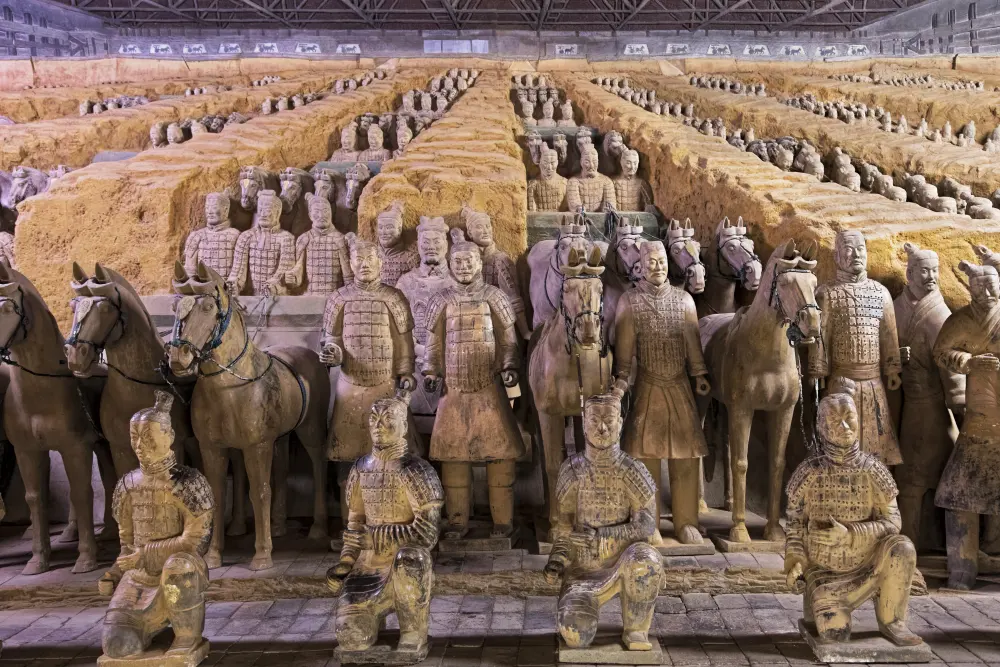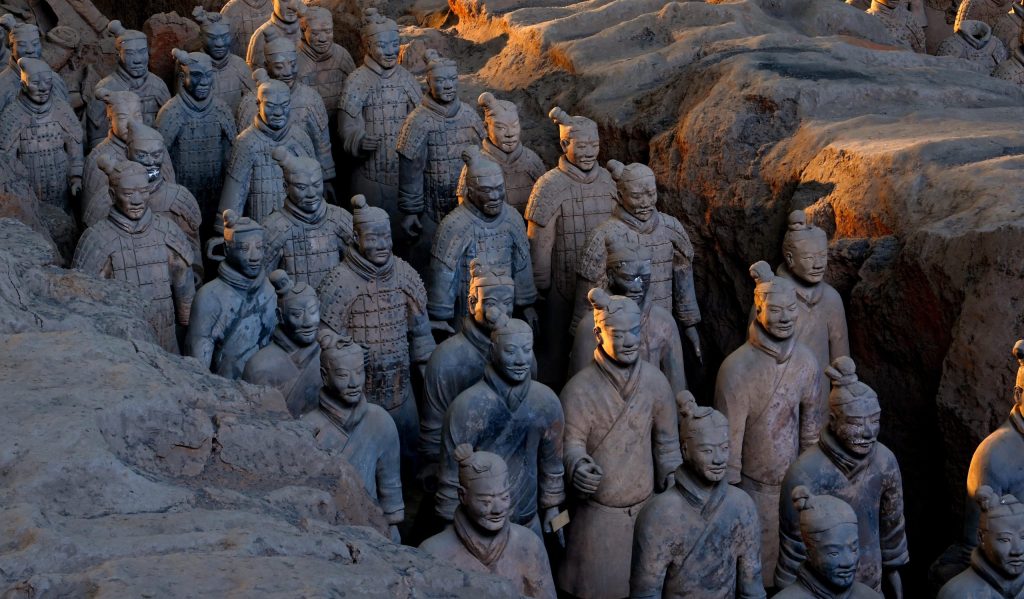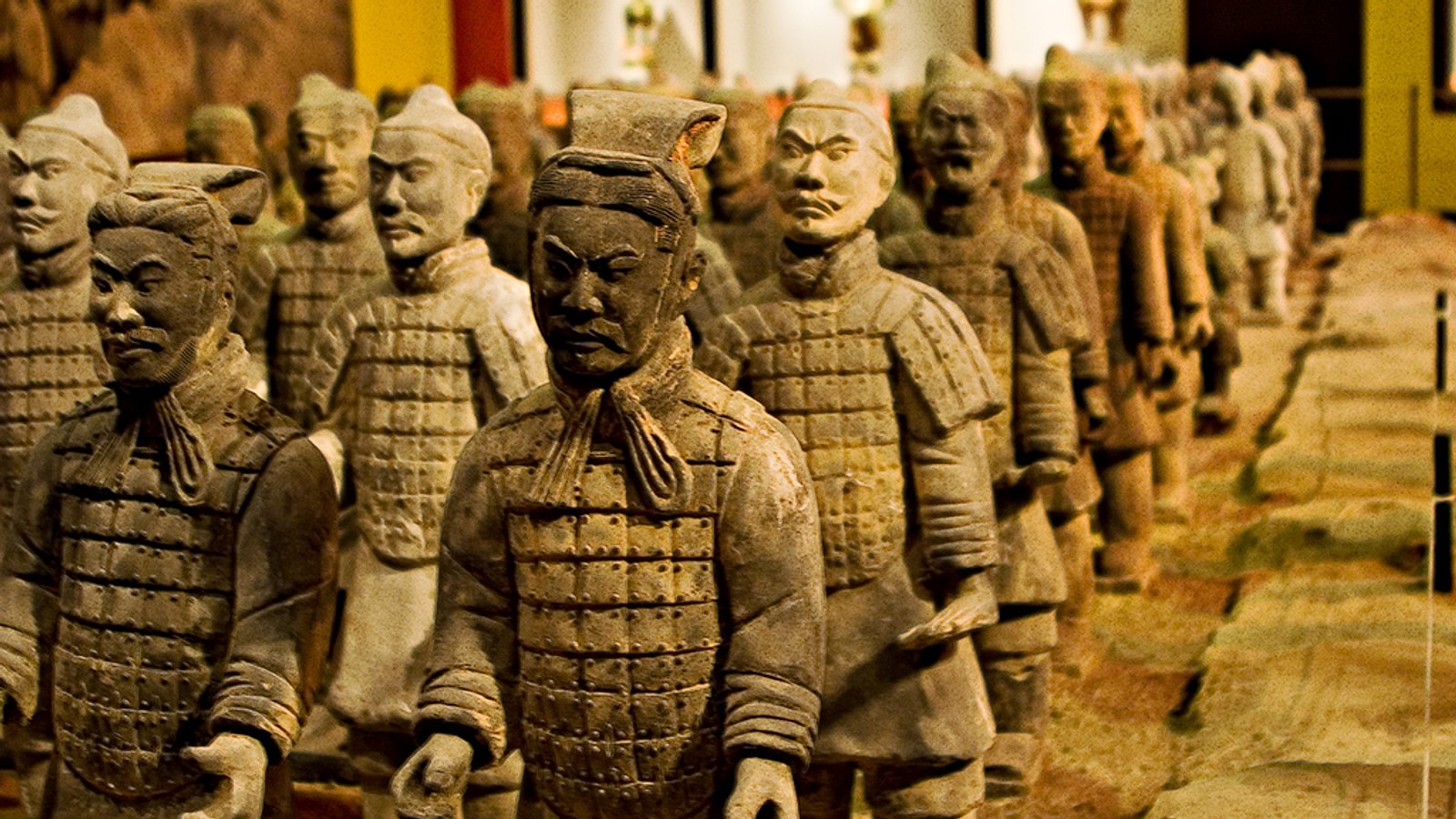Discovering Xi’an’s Terracotta Army: A Journey into China’s Ancient History
Nov 20, 2024 | By Piz za
The discovery of the Terracotta Army in Xi’an, Shaanxi Province, China, stands as one of the most significant archaeological finds of the 20th century. This monumental discovery not only offers a glimpse into the military prowess of ancient China but also provides profound insights into the cultural and technological advancements of the Qin Dynasty. Unearthed in 1974 by local farmers, this army of life-sized clay soldiers has since captivated historians, archaeologists, and tourists alike, drawing attention to the enigmatic legacy of China’s first emperor, Qin Shi Huang (History.com).
Historical Context
The Terracotta Army was created to accompany Emperor Qin Shi Huang, the founder of the Qin Dynasty, in his afterlife. Qin Shi Huang ascended to the throne in 246 BCE at the age of 13 and is credited with unifying China in 221 BCE. His reign marked significant developments, including the standardization of scripts, weights, and measures, and the construction of vast infrastructure projects like the Great Wall (Britannica).

The construction of the Terracotta Army, part of a larger necropolis, began shortly after Qin Shi Huang became emperor and continued until his death in 210 BCE. This massive undertaking involved thousands of laborers and artisans, reflecting the emperor’s desire for immortality and protection in the afterlife (Wikipedia).
Discovery and Excavation
The Terracotta Army was discovered in March 1974 by local farmers digging a well near the city of Xi’an. This chance discovery led to extensive archaeological excavations, revealing three main pits containing over 8,000 soldiers, 130 chariots, and 670 horses. The figures are arranged in military formation, reflecting the strategic and hierarchical organization of Qin Shi Huang’s army (BBC News).

The first pit, the largest, contains the main army of soldiers, chariots, and horses. The second pit houses a smaller force, including cavalry and archers, while the third pit is believed to be the command center, containing high-ranking officers and charioteers (Britannica).
Artistic and Technological Marvel
The Terracotta Warriors are renowned for their detailed craftsmanship and individuality, with each figure possessing unique facial features and expressions. The figures were originally painted with vibrant mineral colors, though much of the paint has faded over time. The construction of these figures involved sophisticated techniques, including the earliest known use of lathes for polishing and a cellular manufacturing system akin to modern assembly lines (Wikipedia).

Scientific analyses have revealed that the weapons carried by the warriors were made from a unique 13-element alloy, which has remained remarkably well-preserved over the centuries. This suggests advanced metallurgical knowledge during the Qin Dynasty (Britannica).
Cultural Significance and Legacy
The Terracotta Army is not merely a testament to the military might of ancient China but also a reflection of the spiritual beliefs and cultural values of the time. The figures were intended to serve and protect the emperor in the afterlife, embodying the Qin Dynasty’s emphasis on power and immortality (Learning Lab).

Over the years, the Terracotta Army has been the subject of numerous international exhibitions, bringing its historical and cultural significance to a global audience. Exhibitions have been held in major cities worldwide, including Melbourne, London, Seattle, and New York, allowing millions to appreciate this archaeological marvel (Wikipedia).
Must-Visit Sites in Xi’an Beyond the Terracotta Army
Xi’an is a treasure trove of historical and cultural wonders, making it a must-visit destination for travelers. Here are some of the most prominent attractions to add to your itinerary:
- Xi’an City Wall: One of the oldest and best-preserved city walls in China, offering stunning views of the city and an opportunity to bike along its ancient ramparts.
- Big Wild Goose Pagoda: A Tang Dynasty Buddhist pagoda with a serene atmosphere, surrounded by picturesque gardens.
- Muslim Quarter: A vibrant area with a rich blend of Chinese and Islamic cultures, famous for its bustling street food and traditional market stalls.
- Shaanxi History Museum: A premier museum showcasing artifacts from the Zhou, Qin, Han, and Tang Dynasties, offering a deep dive into the region’s rich history.
- Huaqing Palace: A historic site known for its natural hot springs and connection to ancient Chinese emperors.
- Mount Huashan: A sacred Taoist mountain near Xi’an, renowned for its breathtaking scenery and thrilling cliffside paths.
Conclusion
The Terracotta Army of Xi’an remains an enduring symbol of China’s rich historical heritage and the enduring legacy of Emperor Qin Shi Huang. Its discovery has not only reshaped our understanding of ancient Chinese history but also highlighted the remarkable artistic and technological achievements of the Qin Dynasty. As research continues, the Terracotta Army continues to reveal new insights into the past, offering a fascinating glimpse into the world of ancient China.
Related Blogs

India vs New Zealand: A Traveler’s Perspective on Two Unique Destinations
India vs New Zealand are two destinations that offer contrasting yet equally mesmerizing experiences. India vs New Zealand comparisons often highlight India’s centuries-old traditions, bustling bazaars, and architectural marvels versus New Zealand’s breathtaking natural landscapes and adrenaline-pumping adventures. Whether you’re a culture enthusiast, nature lover, or thrill-seeker, this guide will help you explore the best […]

Barbastro Barcelona: A Journey Through Spain’s Hidden Gems
Spain is a treasure trove of culture, history, and breathtaking landscapes. Two destinations that encapsulate the country’s charm are Barbastro Barcelona. While Barcelona is renowned for its vibrant city life and iconic architecture, Barbastro offers a quieter, more traditional Spanish experience nestled in the heart of the Somontano wine region. Together, they create the perfect […]

The Complete Guide to the Carry On Cast: Past, Present, and Future
The Carry On films stand as a cornerstone of British cinema, delivering decades of laughter and unforgettable characters. This iconic comedy franchise, spanning over 30 years, combined slapstick humor, clever wordplay, and a talented ensemble cast that became household names. This guide explores the history of the Carry On cast, their contributions to the franchise, […]

Exploring Austria’s Iconic Opera Houses
Austria, a nation steeped in a rich cultural heritage, stands as a beacon of classical music and artistic excellence. Among its most revered cultural institutions are its opera houses, which serve as both architectural marvels and stages for world-class performances. This report delves into the history, architecture, notable performances, and cultural significance of Austria’s iconic […]

Exploring the Distinctive Andean Music of Bolivia
The Andean music of Bolivia is a vibrant and integral part of the country’s cultural tapestry, deeply rooted in the traditions and spiritual practices of the Andean peoples. This genre of music is not only a form of artistic expression but also a medium through which the stories, legends, and historical narratives of the Aymara […]

Learning About the Carnival Culture in Rio de Janeiro, Brazil
The Rio de Janeiro Carnival, often heralded as the world’s largest and most famous carnival celebration, is a vibrant showcase of Brazilian culture, history, and community spirit. This annual event, which draws millions of participants and spectators from around the globe, is a testament to Brazil’s rich cultural heritage and its capacity for joyous celebration. […]

Mastering Mozzarella: A Taste of Italy
Mozzarella, a semi-soft cheese originating from Italy, is cherished for its creamy texture and mild flavor. Traditionally crafted from buffalo milk, it also finds a popular variant made from cow’s milk. This cheese is not just a culinary staple but a cultural icon, deeply embedded in Italian society and cuisine. Its high moisture content contributes […]

Discovering the Art of Calligraphy in South Korea
Korean calligraphy, known as “Seoye” (서예), stands as a testament to the rich cultural heritage and artistic expression of Korea. This ancient art form, which involves the artistic writing of both Hanja (Chinese logographs) and Hangul (the Korean native alphabet), transcends mere communication to become a profound medium of aesthetic and spiritual expression. As we […]

Scotland’s Tartan: A History of Highland Dress
Tartan, with its vibrant patterns and historical richness, is one of Scotland’s most iconic symbols. It is inextricably linked to the kilt and the national dress of Scotland, embodying both cultural heritage and identity. This detailed report delves into the origins, evolution, and cultural significance of tartan and Highland dress, exploring how this textile has […]

Tribal Arts of Papua New Guinea: A Unique Heritage
Papua New Guinea (PNG) is a nation marked by its remarkable cultural diversity, with over 800 distinct tribes, each possessing its own language and customs. This diversity is vividly expressed through the tribal arts, which are not only a testament to the rich heritage of the indigenous people but also serve as a living tapestry […]

